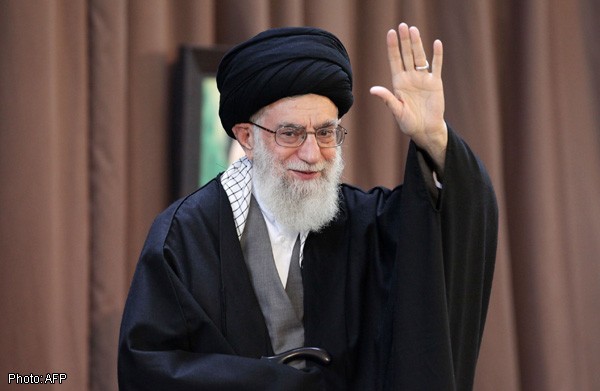Iran's leader calls for self-reliance in face of sanctions

TEHRAN - Iran's supreme leader on Friday sounded a battle cry for self-reliance in the face of international sanctions, saying Iranians should not pin their hopes on a nuclear deal with world powers.
Ayatollah Ali Khamenei, Iran's most powerful authority, has lent his support to nuclear talks that have brought limited sanctions relief, but harbours a deep mistrust of the West, believing it is bent on destroying the Islamic republic.
"Iran must strengthen itself," he said in an annual speech marking the Persian New Year which is widely seen as establishing guidelines for the elected president, in this case Hassan Rouhani, who has championed diplomatic engagement with the West.
"The extortionists in the world will blackmail a weak nation, insult it, attack it, and trample it under their feet," Khamenei said.
Reeling from double-digit inflation, high unemployment, stagnation and mismanagement, Iran's oil-reliant economy has struggled to cope with US-led sanctions aimed at curtailing its nuclear ambitions.
Western powers and Israel suspect Iran is covertly pursuing a nuclear weapons capability alongside its civilian programme, charges adamantly denied by Tehran.
Hopes for an economic recovery have been rekindled since Rouhani took office in August, vowing to repair relations with the world and find a lasting solution to the decade-long nuclear standoff.
In his own address Thursday, Rouhani said he had tackled inflation and restored calm to currency markets, thanks to an interim deal struck in November under which Iran curbed or froze some nuclear activities in exchange for a modest easing of sanctions.
The so-called P5+1 group - Britain, China, France, Russia and the United States plus Germany - hopes to reach a final accord with Iran by July 20 which would lift all sanctions in exchange for Iran scaling back its programme to the point where it would be difficult if not impossible to develop nuclear weapons.
But Khamenei said Iran "should not be pinning its hopes on when the enemy will lift the sanctions." "The hell with them. We should look into what we can do ourselves," Khamenei said, calling for greater self-reliance through boosting productivity and pursuing a buy-Iran campaign under the title "economy of resistance."
Questioning the Holocaust
In another jab at the West, Khamenei reiterated his doubts about the Holocaust, and appeared to draw parallels between "red lines" about questioning the event in the West and Iran's own policies on freedom of expression.
"Expressing opinion about the Holocaust, or casting doubt on it, is one of the greatest sins in the West. They prevent this, arrest the doubters, try them while claiming to be a free country," said Khamenei, who has repeatedly called the Holocaust a "myth."
"They passionately defend their red lines ... How do they expect us to overlook our red lines that are based on our revolutionary and religious beliefs."
In contrast to his predecessor Mahmoud Ahmadinejad, who often dismissed Nazi Germany's murder of six million Jews as a fabrication, Rouhani has adopted a softer line, going to far as to condemn "the massacre of the Jews by the Nazis." Rouhani, a self-declared moderate, has vowed to improve social freedoms in a country where more than half the population is under 30 years old.
But this has proved difficult in face of aggressive opposition from conservatives and hardliners in the establishment who have long viewed liberalisation as a soft war by the West against Iran's Islamic values.
Khamenei drew attention to the issue of culture, which he said "is even more important than the economy." "It is the air you breathe. If it is clean it has one effect, and another if it is dirty," he said, adding that authorities must be vigilant in repelling "cultural breaches." "The focus of the enemy is on the culture more than anything else," Khamenei said.
Iran defends its human rights records and the restrictions it places on freedom of expression as being rooted in Islam and the country's cultural traditions.
Tehran banned two pro-reform newspapers in recent months after they published comments that were seen as critical of Islam.
Last week UN chief Ban Ki-moon scolded Iran for an increase in executions, the detention of dissidents and discrimination against women.